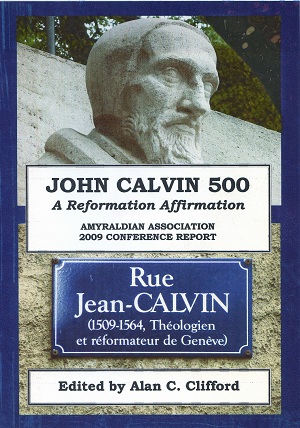JOHN CALVIN 500: A Reformation Affirmation
To purchase using PayPal/credit/debit card (a new window will open
JOHN CALVIN 500: A Reformation Affirmation
AMYRALDIAN ASSOCIATION 2009 CONFERENCE REPORT
EDITOR: DR ALAN C. CLIFFORD
Pbk 218 pages £12.50 (postage extra)
CONTENTS
1. Calvin & Christ: The Faith – David F. Bond
2. Calvin & Calvinism: Amyraut et al – Alan C. Clifford
3. Calvin & Church: Presbyterian Order – Ronald A. Barnett
4. Calvin & Covenant: Baptism – Stephen M. Quinton
5. Calvin & Comfort: Assurance – J. Nigel Westhead
6. Calvin & Courage: Under the Cross – J. E. Hazlett Lynch
7. Addendum: John Calvin & John Wesley: An English Perspective – Alan C. Clifford
Index of Scripture
Index of Persons
PUBLISHER’S FOREWORD
The John Calvin Quincentenary (1509-2009) proved to be an event of immense importance and fascination. All who admire the Genevan reformer clearly welcomed every opportunity to express their acknowledgment of his greatness as a man of God and Christian leader. Recognising the tendencies to either ‘adore’ or ‘abhor’ Calvin, even the most determined detractors of the protestant reformer par excellence cannot deny his impact on sacred and secular history. It is doubtful if the most vehement enemies are able entirely to ignore him, however hard they might try. In which case, unavoidable bad publicity—as opposed to ‘no publicity’—has stimulated even the most ignorant to explore the legacy of the godly genius of Geneva.
Of course, Calvin’s memory continues to be lamented by the vast majority of Roman Catholics whose medieval monopoly on religious truth was so comprehensively assaulted by his magisterial contribution. Liberals of all denominational traditions doubtless respond with a mixture of admiration and scorn, unable as they are convincingly to re-write history to their satisfaction. Conservative Protestants of all hues—in varying degrees—have welcomed the Calvin celebration insofar as his emphases appear to vindicate their own. Reformed, Presbyterian and other Christians unashamed to be known as ‘Calvinists’ have doubtless rejoiced in the opportunity to highlight their doctrinal distinctives at a time when biblical truth is increasingly held in contempt across great swathes of religious as well as secular opinion.
Yet, considering Calvin’s professed ‘disciples’, the Quincentenary has probably aroused some disquiet, especially among those interested in the ‘Calvin versus the Calvinists’ debate. Ever since the publication of Brian G. Armstrong’s ground-breaking study Calvinism and the Amyraut Heresy (1969), determined efforts have been made to minimise the undeniable differences between Calvin and his ‘ultra-orthodox’ followers. When every attempt positively to locate Calvin within the medieval to early-modern scholastic stream has been made, significant gaps—of the kind highlighted by Amyraldian scholars—remain. Calvin’s explicit teaching on the extent of the atonement cannot be diluted in the soup of recent and ongoing scholarly discussion. Of course, it is inappropriate for adherents of the Protestant rule of faith to make Calvin a benchmark for truth. Yet many of us believe that, from a biblical exegetical standpoint, Calvin’s expositions of this disputed theme make his views especially attractive and compelling.
In a wider context of concern, the same may be claimed for the reformer’s views on the Christian Faith in general, and on church government and baptism in particular. The 2009 conference revisited these important issues, the second and third too often marginalized by ‘evangelicals’ as of ‘secondary significance’. We were also concerned to address the ever-pressing personal questions surrounding assurance and courage in the face of increasing hostility towards Bible-believing Christians from secular, ecumenical and multi-faith quarters. We believe that a continuing and growing crisis of confidence among many demanded a fresh consideration of the religious realities associated with the contribution of John Calvin. We were grateful to our speakers for bringing the labours of this faithful servant of Christ to our attention. The results of their efforts are now published, including Dr Clifford’s paper given at the International Calvin Congress held at Geneva in May 2009 (see Appendix).
